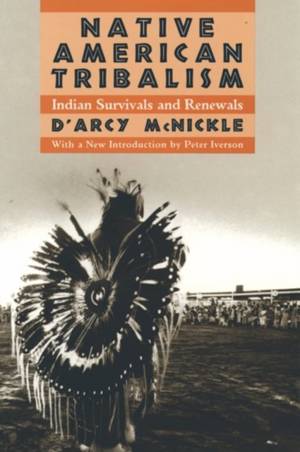
En raison d'une grêve chez bpost, votre commande pourrait être retardée. Vous avez besoin d’un livre rapidement ? Nos magasins vous accueillent à bras ouverts !
- Retrait gratuit dans votre magasin Club
- 7.000.000 titres dans notre catalogue
- Payer en toute sécurité
- Toujours un magasin près de chez vous
En raison de la grêve chez bpost, votre commande pourrait être retardée. Vous avez besoin d’un livre rapidement ? Nos magasins vous accueillent à bras ouverts !
- Retrait gratuit dans votre magasin Club
- 7.000.0000 titres dans notre catalogue
- Payer en toute sécurité
- Toujours un magasin près de chez vous
16,95 €
+ 33 points
Description
Contrary to the white man's early expectations, the Indian tribes of North America neither vanished nor assimilated. Despite almost four hundred years of contact with the dominant--and often domineering--Western civilization, Native Americans have maintained their cultural identity, the size, social organization, and frequently the location of their population, and their unique position before the law. Now brought up to date with a new introduction by Peter Iverson, this classic book reviews the history of contact between whites and Indians, explaining how the aboriginal inhabitants of North America have managed to remain an ethnic and cultural enclave within American and Canadian society from colonial times to the present day.
The late D'Arcy McNickle--renowned anthropologist and member of the Flathead Tribe of Montana--shows that while Native Americans have always been eager to adopt the knowledge and technology of white society, they carefully adapt these changes to fit into their own culture. He maintains that by emphasizing tribal self-determination, the federal government can best help Native Americans to modernize and achieve independence even as they preserve their ancient heritage. Iverson's introduction to the new edition discusses McNickle's singular contribution to Native American Studies, and provides an overview of recent events and scholarship in the field. He has also brought up to date the appendix describing the geographical distribution of the principle tribes in the United States and Canada.
With its comprehensive coverage and unique perspective, the new edition of Native American Tribalism is essential reading for those who want to understand the past and present of our first Americans.
The late D'Arcy McNickle--renowned anthropologist and member of the Flathead Tribe of Montana--shows that while Native Americans have always been eager to adopt the knowledge and technology of white society, they carefully adapt these changes to fit into their own culture. He maintains that by emphasizing tribal self-determination, the federal government can best help Native Americans to modernize and achieve independence even as they preserve their ancient heritage. Iverson's introduction to the new edition discusses McNickle's singular contribution to Native American Studies, and provides an overview of recent events and scholarship in the field. He has also brought up to date the appendix describing the geographical distribution of the principle tribes in the United States and Canada.
With its comprehensive coverage and unique perspective, the new edition of Native American Tribalism is essential reading for those who want to understand the past and present of our first Americans.
Spécifications
Parties prenantes
- Auteur(s) :
- Editeur:
Contenu
- Nombre de pages :
- 208
- Langue:
- Anglais
Caractéristiques
- EAN:
- 9780195084221
- Date de parution :
- 19-08-93
- Format:
- Livre broché
- Format numérique:
- Trade paperback (VS)
- Dimensions :
- 141 mm x 215 mm
- Poids :
- 308 g

Les avis
Nous publions uniquement les avis qui respectent les conditions requises. Consultez nos conditions pour les avis.






